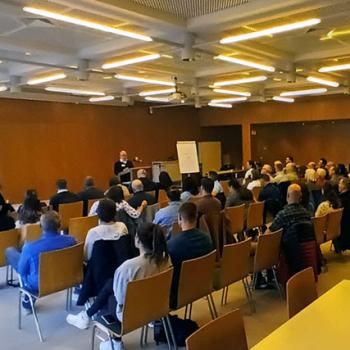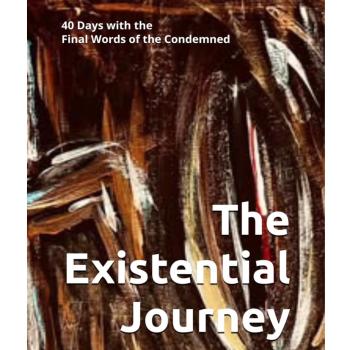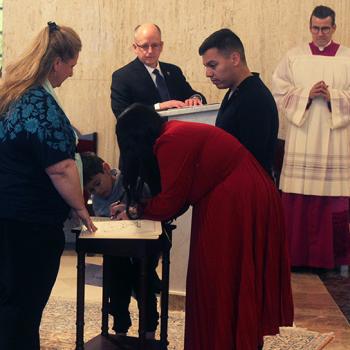It turns out the Jews aren't to blame for Jesus Christ's crucifixion after all. That's the word, at least, from the man who ought to know, Pope Benedict XVI. In volume two of the pontiff's Jesus of Nazareth series, just released, the pope reframes the infamous scene (in Mt. 27) in which Pilate washes his hands of the execution of Christ. The angry crowd, provoked by the chief priests and rabbis, invites the blood of Christ to rest "on us and our children." Yet the blood of Christ, the pope notes, achieves "reconciliation" rather than "vengeance and punishment." Christ's blood "is not poured out against anyone, it is poured out for many, for all."
Although this is not the first time the Church has absolved Jews of their role in Jesus' death—the Second Vatican Council did this officially in the 1960s—Catholic scholars say that this is the first time a pope has made such a pronouncement.
I know what you're thinking. Who cares what the pope does? Evangelicals have a much friendlier relationship with Jews than Catholics ever did, what with the adapted Jewish worship dance classes and the overwhelming number of children named after Old Testament prophets. And let's not forget the oft-observed, unconditional support for the state of Israel. Why should evangelicals care if the pope exonerates the Jewish people of Jesus' crucifixion, a death for which no reasonable person holds them responsible?
I bring this to your attention to illustrate a point that is painfully obvious when seen through the lens of another faith tradition, but more difficult to discern in one's own. Sometimes the things we believe, the interpretations we derive from scripture, turn out to be wrong, and we have to make an embarrassing reversal.
This lesson is particularly important in light of recent, seemingly endless comment-section discussions on a number of websites and blogs frequented by evangelicals. One needn't read very far to come across someone making the claim that "Christians have agreed on (fill in the blank) for over 2,000 years." This and its sister-claim, the blind appeal to orthodoxy, are meant to be conversation stoppers, deal breakers that call into question the theology of the offending interlocutor.
The need to check belief against doctrine is legitimate. Jesus himself warned against false teachings. But when is "we've always done it this way" a valid argument?
Stop migrating and live as hunter/gatherers? No, we've always wandered!
Give up our slaves? But we've always had them!
Let women vote? They've never had a voice!
Stop smoking cigarettes? But I've been smoking for thirty years!
Fossil fuels are bad for the environment? Since when?!
Certainly there is something to be said for tradition, and I'm the first to respect the precedent of those who have come before us. Inevitably, however, there are things that we've gotten wrong, interpretations to which our ancestors held for many generations and yet were abandoned when a better interpretation emerged. There are, to be sure, enduring fundamentals to our faith. Yet on top of these are layer upon layer of interpretation and tradition, and from time to time it's worth considering whether these interpretations and traditions still make sense in light of what we've learned along the way.
When, for example, an influential pastor challenges our assumptions about heaven and hell, or when a social activist suggests that we've misaligned our politics and faith, it is worth considering rather than dismissing. And sometimes—not all the time, but sometimes—we find that our views must change.
This should not be scary; we do it all the time and have been doing it for centuries. I mentioned slavery and the role of women, these are two prominent examples, but consider also the belief in purgatory or transubstantiation. These are two beliefs that Protestants essentially grew out of after the Reformation. Or think of the various science-related mistakes that riddle Christianity's past: the papal spat with Galileo or the denial of evolution.
Last week's New Yorker featured "In My Defense," a piece in which staff writer Ian Frazier, a former scoutmaster, appeals to the community to reinstate him. Originally he had "a deep faith in the tripartite divinity." But, after discovering some old books in his uncle's garage he began down a windy path of fascination with a number of heresies. "The danger of heresies," he writes, "is that one leads to another." As the author ticks off the heresies he explored, it becomes painfully clear just how many beliefs have been accepted and rejected throughout church history. Our past is littered with mistakes and corrections, and when told by a scoutmaster who explores each of them, it all looks kind of silly.
When you think about it, it's pretty incredible that a pope finally got around to exonerating the Jews of their role in Christ's death. I can only imagine how many times it must have been discussed, only to be shot down with a confident cry, "But, we've always blamed the Jews!"
3/9/2011 5:00:00 AM





